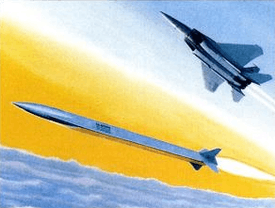Have Dash
Have Dash was a program conducted by the United States Air Force for the development of a stealthy air-to-air missile. Although the Have Dash II missile appears to have been flight tested, the results of the project remain classified and no production is believed to have been undertaken.
| Have Dash | |
|---|---|
 Have Dash II | |
| Type | Air-to-air missile |
| Place of origin | United States |
| Service history | |
| Used by | United States Air Force |
| Production history | |
| Designed | 1990–1992 |
| Manufacturer | Ford Aerospace |
| Specifications | |
| Mass | 400 pounds (180 kg) |
| Length | 12 feet (3.7 m) |
| Engine | Rocketdyne Mk 58 Mod 5 |
| Propellant | Solid fuel |
Operational range | 30 miles (48 km) |
| Maximum speed | Mach 4+ |
Have Dash I
Have Dash I was a classified project to develop an air-to-air missile for use by stealth aircraft.[1] The concept, developed by the USAF Armament Laboratory between 1985 and 1988,[2] was extensively studied but failed to produce any flying hardware.[3]
Have Dash II
Have Dash II, initiated in 1990, was a renewed effort to develop a stealthy air-to-air missile, intended to be used by the Advanced Tactical Fighter – the YF-22 and YF-23 – and to replace the AIM-120 AMRAAM in service.[1]
Have Dash II was designed with a composite body, trapezoidal in shape. This was intended both to reduce the missile's radar-cross-section[3] and to resist heat at hypersonic speeds, as the missile was intended to operate at Mach 5.[1] The body shape also allowed flush external carriage aboard the launching aircraft, and provided aerodynamic lift, making the missile more maneuverable.[3]
The prototype Have Dash II missiles were recoverable,[1] and utilised Rocketdyne Mk 58 solid-fueled rocket motors of the same type used by the AIM-7 Sparrow.[3][4] Production missiles were expected to be powered by a ramjet engine,[1] and would use inertial navigation during the cruise phase of flight, with a dual-mode infrared/active radar seeker head for terminal guidance.[3]
Flight testing of the prototype Have Dash II missiles was expected to begin in 1992;[1] it appears that the testing was conducted, with the missile being considered for further testing of advanced air-to-air missile concepts.[2] However, no results of the test firings have been declassified, and the missile's development was not further pursued.[3]
References
Notes
- Popular Mechanics, March 1990
- "Have Dash II: Development Test and Evaluation of an Advanced Air-To-Air Missile Concept". Society of Experimental Test Pilots Symposium Proceedings, Volumes 36–37, p. 159. (1992)
- Parsch 2005
- "Have Dash II bank-to-turn technology may be valuable for AMRAAM." Defense Daily, April 21, 1992.
Bibliography
- Dane, Abe, ed. (March 1990). "Tech Update:Hypersonic Air-To-Air Missile". Popular Mechanics. New York: The Hearst Corporation. 167 (3): 18. ISSN 0032-4558. Retrieved 2010-12-29.
- Parsch, Andreas (2005). "Loral (Ford Aeronutronics) HAVE DASH II". Directory of U.S. Military Rockets and Missiles. designation-systems.net. Retrieved 2010-12-29.